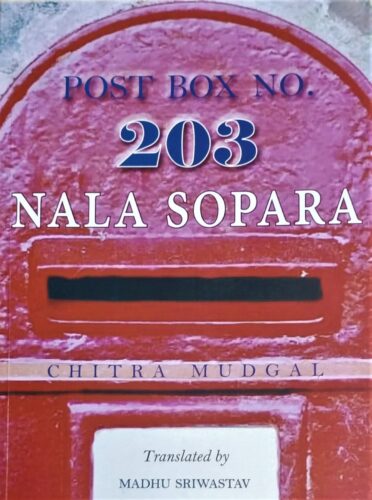Post Box No 203 Nala Sopara
Author: Chitra Mudgal
Translator: Madhu Sriwastav
ISBN: 978-93-5548-398-0 (Paperback)
Edition: (2022)
Price: Rs 300.
Published by Sahitya Akademi
Chitra Mudgal is an eminent Hindi writer and a renowned social activist. Her novel Post Box No 203 Nala Sopara won the prestigious Sahitya Akademi Award. Madhu Sriwastav an academic, translator, and creative writer has deftly translated her novel into English. Translation is never easy and it requires skill to straddle two languages. Recalling her journey she writes, “As a translator, I had to constantly switch between the syntax, grammar, and punctuation of two very different languages trying to convey the meaning, culture, and emotions”. Post Box No 203 Nala Sopara challenges the concepts of body and gender and also looks critically at the questions of what qualifies as acceptance by families/ society. The traditional notions of (trans) gender with its patriarchal values that are deeply problematic, lend themselves to a conversation about the relevance of such practices in today’s world. But Mudgal does not stop at that. Through the genre-bending novel, she enquires into the ideas with which she can identify and allows her work to powerfully speak her mind. Taking her readers on a journey of discovery with unexpected experiences at every turn she questions the attitude and prejudices of society towards the transgender/ eunuchs/ hijras.
Written in an epistolary form Post Box No 203 Nala Sopara is the story of Binni aka Vinod aka Vimli a transgender. In his childhood, he was a meritorious student –an all-rounder who excelled at everything loved Jyotsna and wanted to earn a name in life. All he lacked was a penis— “Why don’t I have a penis, ba?” / “You had cajoled me saying, “When a child is born one has to fix a penis made of flour. The nurse forgot to fix yours. We will get yours fixed too”. “The concept of transgender is described as a clinically significant distress due to a marked and persistent incongruity between the experienced gender and assigned gender and related to a continual and strong desire to be another gender and a robust preference to be every other gender”1. Vinod aka Binni aka Vimli looks around and finds his mota bhai –elder brother Siddhartha and his younger brother Manjul are different from him. His family ‘others’ him and does not disclose his identity to the world. From the very beginning, Vinod aka Binni aka Vimli suffers from an identity crisis. This theme has been explored by Mudgal in Post Box No 203 Nala Sopara. Forceful separation from his family by a band of eunuchs shoves him into the darkest dungeons of society. The novel is also themed on perseverance, resilience, and resistance to adversity. Vinod aka Binni aka Vimli hates his body and the bodies of transgender people their ritualistic clapping of hands and other beliefs and practices, representing something primal in the many encounters the novel represents. Vinod aka Binni aka Vimli explores identity systems—the dynamic transformation of shared practices among the transgender communities, and embodies the collective memory of his childhood, his bonding with his mother, and the severance of familial ties as a tradition. Chitra Mudgal in Post Box No 203 Nala Sopara is an artist with a social commitment and the artist’s brutal candour is remarkable.
“How can a society that worships gender, bear with the genderless? / Parents are guilty but the larger share of guilt lies with the cruel, unkind, hypocritical religious analyst’s bigotry./ If you worship gender, do so, but do not deprive others. God resides in every particle, everybody has a right to life, and even transgenders have this right. The loftiness of creation doesn’t get marred by aberrations”. Having witnessed the cruel end to Punam’s life, Vinod aka Binni aka Vimli –the pensive figure crouched all alone distilled it into prints of luminous clarity in his psyche. The human imperfections of Vinod aka Binni aka Vimli’s / Punam’s body stand out in contrast to the flawless grandeur of societal expectations and norms. As Vinod aka Binni aka Vimli’s mind’s eye travels over the tattered whole, the torn flesh, the hollowed insides, and the splintered bones of Punam’s gang-raped body these traumas are brought alive for the readers.
The character of the protagonist Vinod aka Binni aka Vimli does not wallow in pity for being a ‘transgender’ he does not come across as a victim but as a picture of dignity who demands courage and resilience of a high order. The translation has broadened the horizon of English Literature. It is time to raise a toast to the successful translation of Bhasa literature on the English stage.
Weinforth, G.; Fakin, R.; Giovanoli, P.; Nuñez, D.G. Quality of Life Following Male-To-Female Sex Reassignment Surgery. Dtsch. Arztebl. Int. 2019, 116, 253–260. [Google Scholar] [CrossRef] [PubMed]









Add comment